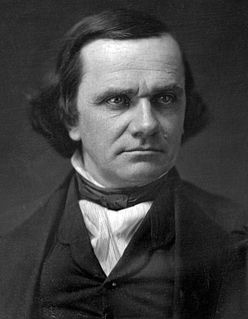A Quote by William Rawle
It depends on the state itself to retain or abolish the principle of representation, because it depends on itself whether it will continue a member of the Union. To deny this right would be inconsistent with the principle on which all our political systems are founded, which is, that the people have in all cases, a right to determine how they will be governed. This right must be considered as an ingredient in the original composition of the general government, which, though not expressed, was mutually understood. . .
Quote Topics
Abolish
Because
Cases
Composition
Considered
Continue
Deny
Depends
Determine
Expressed
Founded
General
Governed
Government
How
Inconsistent
Ingredient
Itself
Member
Must
Mutually
Original
Our
People
Political
Political System
Political Systems
Principle
Representation
Retain
Right
State
Systems
Though
Understood
Union
Whether
Which
Will
Would
Would Be
Related Quotes
I deny the right of Congress to force a slaveholding State upon an unwilling people. I deny their right to force a free State upon an unwilling people. I deny their right to force a good thing upon a people who are unwilling to receive it. The great principle is the right of every community to judge and decide for itself, whether a thing is right or wrong, whether it would be good or evil for them to adopt it; and the right of free action, the right of free thought, the right of free judgment upon the question is dearer to every true American than any other under a free government.
I feel myself always the patriot of all oppressed fatherlands. Nationality is a historic, local fact which, like all real and harmless facts, has the right to claim general acceptance. Every people, like every person, is involuntarily that which it is and therefore has a right to be itself. Nationality is not a principle; it is a legitimate fact, just as individuality is. Every nationality, great or small, has the incontestable right to be itself, to live according to its own nature. This right is simply the corollary of the general principal of freedom.
I consider, then, the power to annul a law of the United States, assumed by one state, incompatible with the existence of the Union, contradicted expressly by the letter of the Constitution, unauthorized by its spirit, inconsistent with every principle on which it was founded, and destructive of the great object for which it was formed.
Surely, if it is the right of the people to "alter or abolish," it is their right to criticize, even severely, policies they believe destructive of the ends for which government has been established. This principle, in the Declaration of Independence, suggests that true patriotism lies in supporting the values the country is supposed to cherish: equality, life, liberty, the pursuit of happiness. When our government compromises, undermines, or attacks those values, it is being unpatriotic.
The State which we have founded must possess the four cardinal virtues of wisdom, courage, discipline and justice ... Justice is the principle which has in fact been followed throughout, the principle of one man one job, of minding one s own business , in the sense of doing the job for which one is naturally fitted and not interfering with other people.
Now what is just and right is to be interpreted in the sense of 'what is equal'; and that which is right in the sense of being equal is to be considered with reference to the advantage of the state, and the common good of the citizens. And a citizen is one who shares in governing and being governed. He differs under different forms of government, but in the best state he is one who is able and willing to be governed and to govern with a view to the life of virtue.
Sorrow, terror, anguish, despair itself are often the chosen expressions of an approximation to the highest good. Our sympathy in tragic fiction depends on this principle; tragedy delights by affording a shadow of the pleasure which exists in pain. This is the source also of the melancholy which is inseparable from the sweetest melody. The pleasure that is in sorrow is sweeter than the pleasure of pleasure itself.
I do verily believe that if the principle were to prevail of a common law being in force in the United States (which principle possesses the general government at once of all the powers of the state governments, and reduces us to a single consolidated government), it would become the most corrupt government on the earth.
When you're going to school primarily for career purposes, it's more important to focus on which program is best for you. In addition, your success at college depends far more on what you do at the college than at which college you do it: Choosing the right program, then the right advisor, the right courses, the right term papers, the right co-curricular activities, the right fieldwork, the right internships. You can make those choices at any college.
A living system continually re-creates itself. But how this occurs in social systems such as global institutions depends on our level of awareness, both individually and collectively... As long as our thinking is governed by industrial, "machine age" metaphors such as control, predicatbility, and "faster is better", we will continue to re-create institutions as we have, despite their increasing disharmony with the larger world.

































